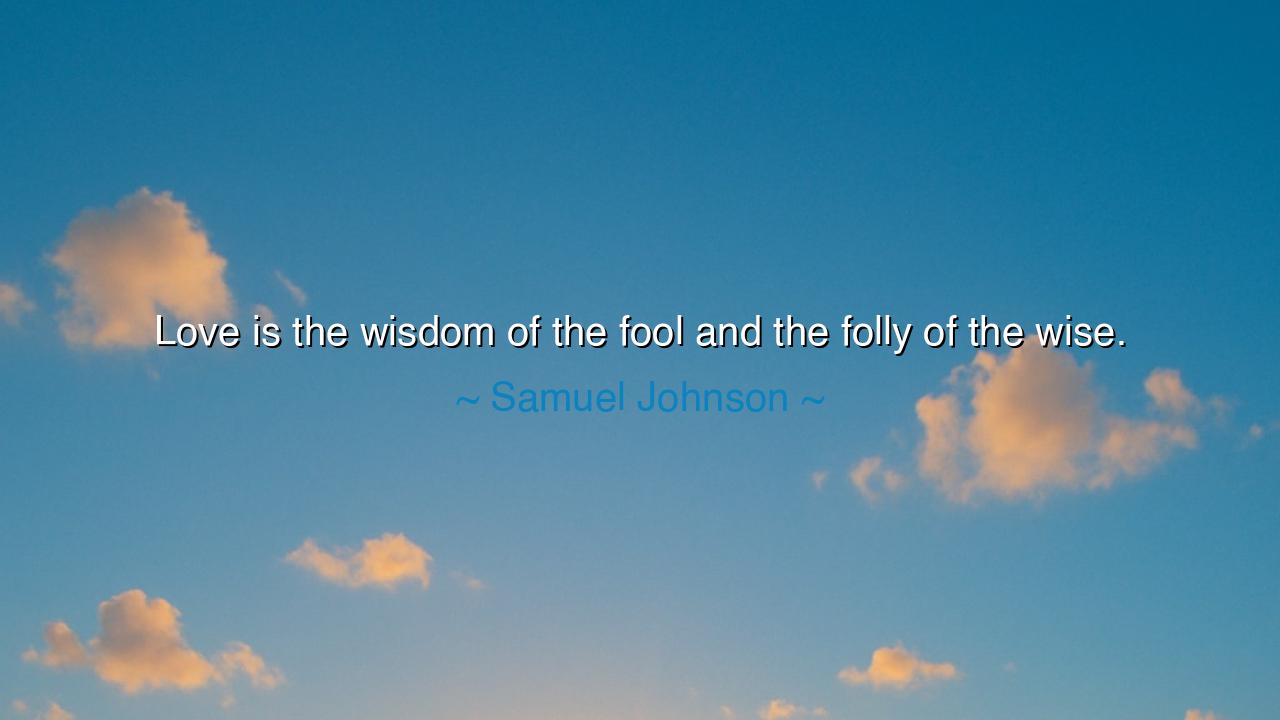
Love is the wisdom of the fool and the folly of the wise.






Samuel Johnson, the renowned English writer and thinker, offers us a paradox in his statement: “Love is the wisdom of the fool and the folly of the wise.” In these words, Johnson encapsulates the complexity of love, a force that is both a source of great insight and great folly. To the fool, love can appear as the pinnacle of wisdom, a truth that guides the heart through the maze of life’s challenges, something pure and self-evident. Yet to the wise, love often appears as a foolish pursuit, one that leads to sacrifice, vulnerability, and the risk of heartbreak. In this sense, love transcends simple logic—it confounds the mind and drives people to act in ways that are often irrational, yet deeply human.
In the ancient world, the philosophers often grappled with the nature of love, seeking to understand whether it was a force of reason or madness. Plato, in his Symposium, suggests that love is both a powerful force that propels the soul towards truth and beauty but also a kind of madness that leads people to act against their own best interests. For Plato, love was a divine madness—a force that elevates the soul but also causes individuals to abandon reason in pursuit of something greater. In this way, love is both the wisdom of the fool, who acts out of pure emotion, and the folly of the wise, who understands its risks but cannot resist its pull.
Consider, O children, the example of Antigone in the ancient Greek tragedy. Her love for her brother Polynices led her to defy the king’s order, an act that ultimately led to her death. To some, Antigone’s act was foolish, a reckless display of loyalty that defied reason and law. Yet to her, it was a deep wisdom, a guiding principle that allowed her to act according to what she believed was right. Her love for her brother and her sense of duty were so strong that she was willing to sacrifice everything for it. In this way, Antigone embodied Johnson’s idea: her love was both the wisdom of the fool, who acted without consideration of the consequences, and the folly of the wise, who understood the risks yet could not resist the moral imperative of love.
In contrast, consider the story of King Solomon, who, in his great wisdom, was often seen as an embodiment of reason and intelligence. Yet even Solomon, the wisest of kings, was tempted by love. His many marriages to foreign princesses were seen by some as an act of folly—a political and personal choice that eventually led to the division of his kingdom. Solomon’s heart, although filled with wisdom, was still vulnerable to the passions of love, showing us that even the wise cannot entirely escape love’s sway. His story reminds us that love, in all its forms, transcends reason and logic, leading even the most intelligent to acts that may seem foolish in hindsight.
The story of Romeo and Juliet, too, embodies this duality. Their love, pure and passionate, drove them to defy their families and even the very laws of their society. To many, their love was the wisdom of the fool, young and untamed, seeking to unite in the face of impossible odds. Yet to others, especially the wise elders around them, their love was pure folly, the kind of impulsive and dangerous affection that led them to tragedy. Romeo and Juliet showed us that love is often a force that blinds us to reason, driving us to act in ways that are both beautiful and tragic. Their love, in its youthful intensity, was a wisdom to them, but a folly to those who saw the world through a more logical, experienced lens.
The lesson Johnson offers us is one that we must all understand: love is both wise and foolish, and its paradoxical nature defines it. It is the wisdom of the fool because love can lead us to acts of great courage, sacrifice, and even self-actualization, much like the fool who follows his heart regardless of the consequences. And it is the folly of the wise because even the most knowledgeable and experienced among us can be led astray by love’s pull, abandoning reason for the sake of passion and emotion. This dual nature of love is what makes it such a profound force in our lives—one that elevates and destroys, that brings us closer to truth and yet blinds us in the process.
O children of the future, take heed of this wisdom: love deeply, but know that in loving, you will find both joy and suffering, wisdom and folly. Let love be your guide, but do not forget that love is both a force that can elevate you and one that can cause you to act without reason. Do not shy away from love because it may lead you into foolishness, for it is through love that we learn the most about ourselves and the world around us. And though love may sometimes appear as folly, it is through this folly that we discover our true strength and purpose. Love, in its highest form, is the wisdom of the fool and the folly of the wise, and in embracing both sides of this paradox, we embrace the fullness of the human experience.
Let love be your teacher, and let it guide you, but always remember that the most profound truths are often found in the tension between reason and passion, between wisdom and folly. Live, love, and learn, knowing that in each act of love, you will find both wisdom and folly, and through both, you will come to understand the true nature of the heart.






AAdministratorAdministrator
Welcome, honored guests. Please leave a comment, we will respond soon